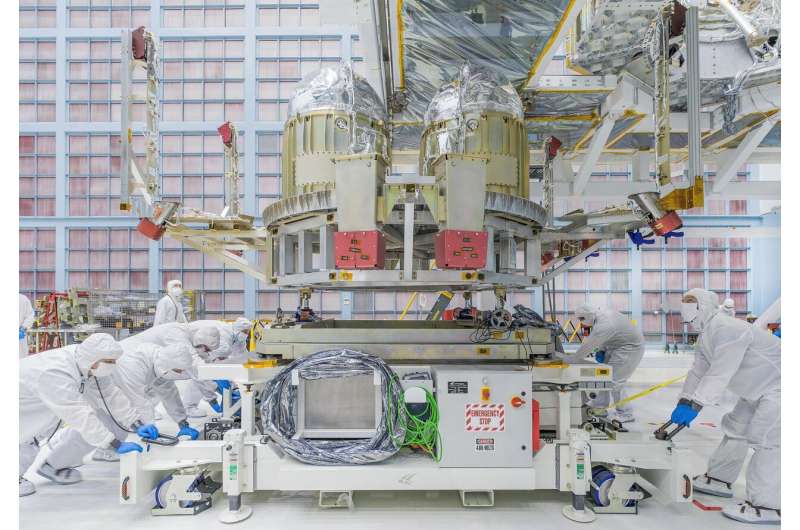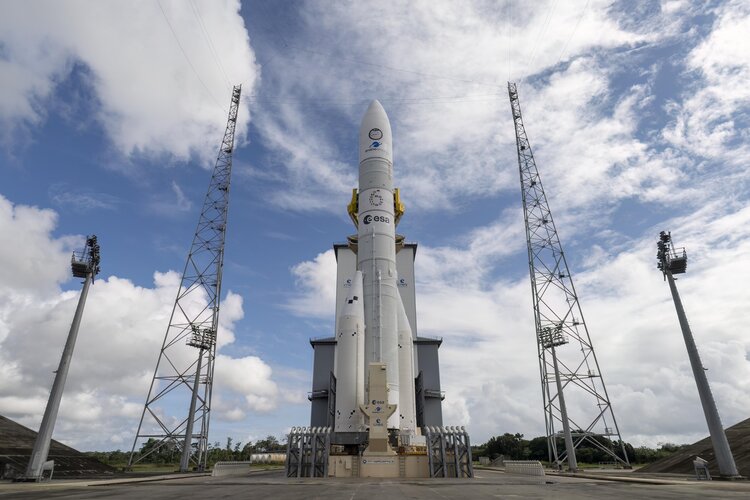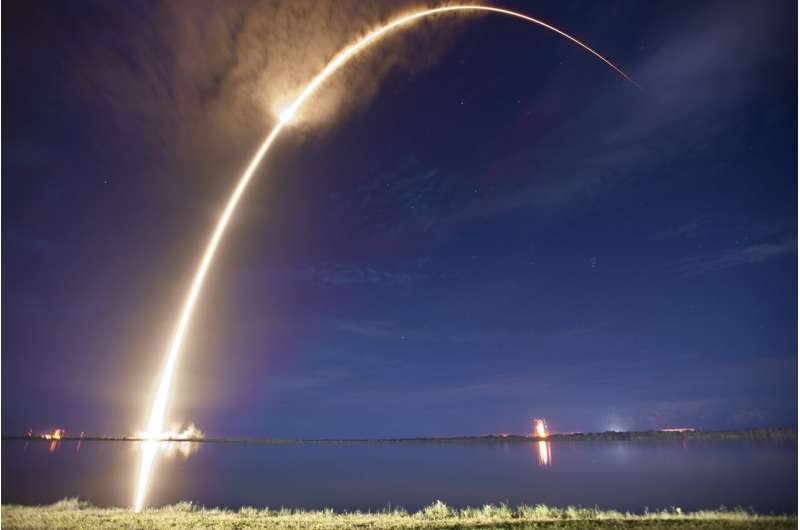Lockheed Martin secures $977.5 million contract extension for missile-warning satellites
Friday, 21 June 2024 21:17

Northrop Grumman delivers Arctic broadband satellites ahead of scheduled July launch
Friday, 21 June 2024 17:46

X-Bow to develop solid rocket motors for U.S. Navy Standard missiles
Friday, 21 June 2024 15:26

Augmented reality speeds spacecraft construction at NASA Goddard
Friday, 21 June 2024 15:16
Technicians armed with advanced measuring equipment, augmented reality headsets, and QR codes virtually checked the fit of some Roman Space Telescope structures before building or moving them through facilities at NASA's Goddard Space Flight Center in Greenbelt, Maryland.
"We've been able to place sensors, mounting interfaces, and other spacecraft hardware in 3D space faster and more accurately than previous techniques," said NASA Goddard engineer Ron Glenn.
Slingshotting around the sun would make a spacecraft the fastest ever
Friday, 21 June 2024 14:09
NASA is very interested in developing a propulsion method to allow spacecraft to go faster. We've reported several times on different ideas to support that goal, and most of the more successful have utilized the sun's gravity well, typically by slingshotting around it, as is commonly done with Jupiter currently.
But, there are still significant hurdles when doing so, not the least of which is the energy radiating from the sun simply vaporizing anything that gets close enough to utilize a gravity assist. That's the problem a project supported by NASA's Institute for Advanced Concepts (NIAC) and run by Jason Benkoski, now of Lawrence Livermore National Laboratory, is trying to solve.
The project was awarded a NIAC Phase I grant in 2022, focused on combining two separate systems—a heat shield and a thermal propellant system. According to the project's final report, combining those two technologies could allow a spacecraft to perform what is known as an Oberth maneuver around the sun.
Ariane 6 pre-show: wet dress rehearsal complete
Friday, 21 June 2024 13:00
Yesterday, the first Ariane 6 rocket to launch into space went through its last full ‘wet dress rehearsal’ at Europe’s Spaceport in French Guiana – it provided an exciting sneak peek of what’s to come, stopping just a few seconds before engine ignition and of course, lift-off.
Saharan dust over the Strait of Messina
Friday, 21 June 2024 11:18 Image:
Saharan dust over the Strait of Messina
Image:
Saharan dust over the Strait of Messina SpaceX ends nearly two-week lull with Space Coast launch
Friday, 21 June 2024 10:50
A late scrub due to weather on Tuesday that also took a Wednesday attempt off the board continued SpaceX's Cape Canaveral launch attempt woes of late, but it finally managed a liftoff on June 20, going close to 13 days between launches from the Space Coast, the longest run since late 2022.
It was not for a lack of trying, though, as bad weather and a scrub as the countdown clock hit 0 last week took a different SpaceX mission off the board. That led to SpaceX taking down that mission's Falcon 9 rocket and switching it up with a Falcon 9 rocket this week to launch a European TV satellite.
The first try on Tuesday night, though, faced high winds at the launch site, forcing a scrub just minutes before liftoff. SpaceX then called off a Wednesday attempt because of "ongoing unfavorable weather at the launch and recovery sites."
The company then shifted to Thursday, and finally managed the launch of the SES 24 mission, lifting off at 5:35 p.m. Eastern time from Cape Canaveral Space Force Station's Space Launch Complex 40.
Rocket Lab launches first Kinéis satellites on 50th Electron
Friday, 21 June 2024 10:32

Space Team Europe for Ariane 6: Laëlla Marimoutou
Friday, 21 June 2024 09:30 Video:
00:02:23
Video:
00:02:23
They say it takes a village to raise a child. To launch a rocket, we have the combined expertise and passion of Space Team Europe. Laëlla Marimoutou is one of many making the first Ariane 6 launch possible and has been interviewed as part of a series highlighting some of the people that make up this dream team.
ArianeGroup’s Laëlla Marimoutou works on quality assurance for Ariane 6. As Launch System Quality Assurance Deputy Laëlla ensures the rocket is ready for liftoff. Improvement is infinite and quality is inspiring.
Stay tuned for more from #SpaceTeamEurope: an ESA space community engagement
Week in images: 17-21 June 2024
Friday, 21 June 2024 07:15
Week in images: 17-21 June 2024
Earth from Space: Adam’s Bridge
Friday, 21 June 2024 07:00 Image:
This Copernicus Sentinel-2 image shows Adam’s Bridge, a chain of shoals linking India and Sri Lanka.
Image:
This Copernicus Sentinel-2 image shows Adam’s Bridge, a chain of shoals linking India and Sri Lanka. Scientists use heart and lung model to calculate potential health threats facing future space tourists in microgravity
Friday, 21 June 2024 03:00
Space exploration has always captivated our imagination, offering the promise of discovering new worlds and pushing the boundaries of human capability. As commercial space travel becomes more accessible, individuals with various underlying health conditions—including heart failure—may soon be among those venturing beyond Earth's atmosphere.
This raises critical questions about the impact of space travel on humans with potential underlying health problems. Recent research, "Computational modeling of heart failure in microgravity transitions," delves into this issue, offering insights that could shape the future of space travel.
Why study heart failure in space?
The demographic of commercial space travelers is shifting, increasingly including older, wealthy individuals who may not be in optimal health. Unlike professional astronauts, these space tourists typically do not undergo rigorous health screenings or physical training. This shift necessitates a broader consideration of health conditions, such as heart failure, diabetes, and other chronic illnesses, in space mission planning.
Heart failure alone affects over 100 million people globally. Traditionally, space medicine has focused on the effects of microgravity on healthy astronauts. However, the inclusion of non-professional astronauts with preexisting health conditions demands a deeper understanding of how microgravity impacts these individuals.




